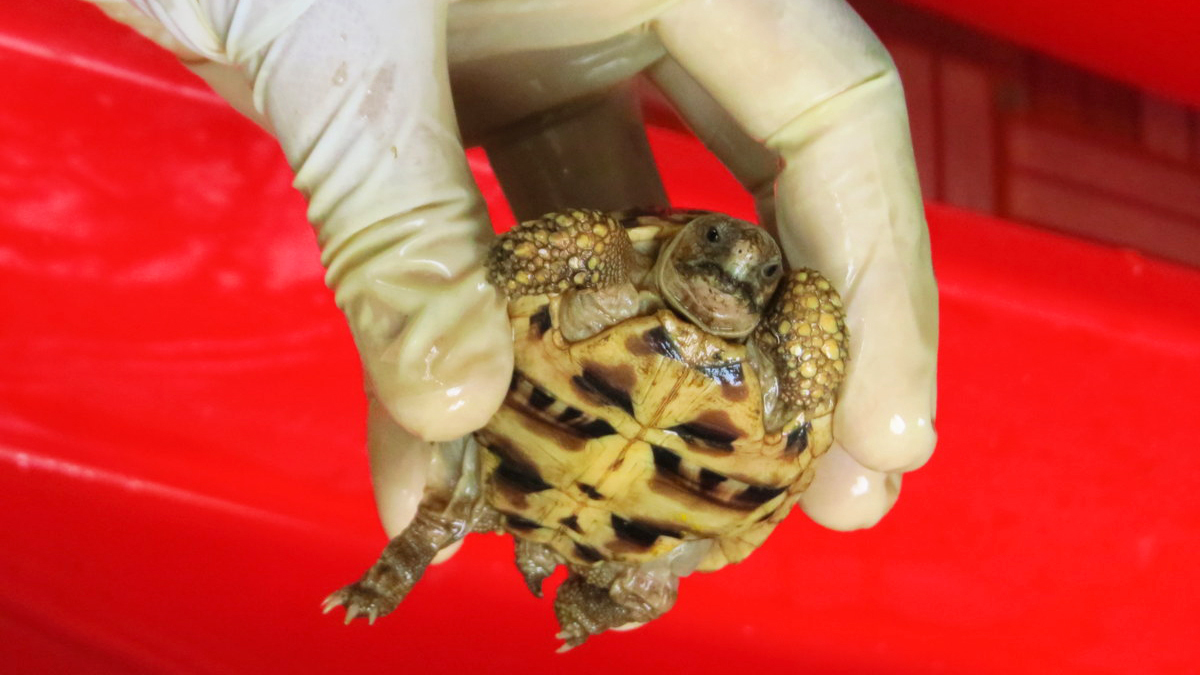CARE – Brazil, Guyana, Congo, and Uganda
Empowering frontline officers to rescue animals from wildlife traffickingNew resources set to improve laws and regulations on illegal wildlife seizures
New resources set to improve laws and regulations on illegal wildlife seizures

(Washington, D.C. – 25 October 2023) – Vital new resources have become available to improve how wildlife management and enforcement agencies manage the seizure and confiscation of live wild animals across the world.
The legal and technical resources are aimed at providing actionable and sustainable solutions to improve laws and regulations for the benefit of frontline officers and the animals they encounter. They were developed by Legal Atlas with support from IFAW and focus on the management of live animals in line with best practices in animal welfare, criminal evidence collection, and biosafety.
The three main resources now available worldwide include:
- International Legal Best Practices for the Custodial Management of Trafficked Live Animals, breaking down the legal and conceptual complexities of the subject and providing an important steppingstone to countries drafting or amending related legislation to guarantee that the objectives of survival of animals and due criminal prosecution are both achieved.
- Evidentiary Protocol for Cases Involving Live Wild Animals serves as a checklist for enforcement agencies that identifies best practices for the gathering, preservation, and use of evidence associated with live wildlife seizures, to contribute to successful prosecutions.
- Model International Agreement on the Repatriation of Trafficked Live Wild Animals and its implementing guidelines provide a model treaty to support countries sharing trafficking routes in enhancing international cooperation and facilitate the rapid repatriation of seized or confiscated wildlife.
“The scale of the illegal trade in wild animals is global and requires urgent attention. IFAW and partners aim to consolidate the capacity of law enforcement officers through a holistic approach to ending wildlife trafficking” said Loïs Lelanchon, Program Manager for Wildlife Rescue at IFAW.
“Legal Best practices and global standards are crucial resources to inspire and guide legal reform in countries committed to a more effective and comprehensive approach to seizures and confiscations of live wildlife in their jurisdictions, in compliance with their international obligations” stated Maria Pascual, Director at Legal Atlas.
These resources are part of the Confiscated Animals – Rescue & Enforcement project led by IFAW with support from the U.S. Department of State’s Bureau of International Narcotics and Law Enforcement Affairs (INL). IFAW partners with Jakarta Animal Aid Network, the Jane Goodall Institute, and Legal Atlas to implement this global project.
The international legal best practices and tools are available through the Legal Atlas site.
// END
For more information or to arrange interviews, please contact:
Stacey Hedman
Communications Director
+1 508 737 2558
shedman@ifaw.org
About IFAW (International Fund for Animal Welfare)
IFAW is a global non-profit helping animal and people thrive together. We are experts and everyday people, working across seas, oceans and in more than 40 countries around the world. We rescue, rehabilitate and release animals, and we restore and protect their natural habitats. The problems we’re up against are urgent and complicated. To solve them, we match fresh thinking with bold action. We partner with local communities, governments, non-governmental organisations and businesses. Together, we pioneer new and innovative ways to help all species flourish. See how at ifaw.org
About Legal Atlas
Legal Atlas is dedicated to decoding the complexities of law, making it understandable and accessible on a global scale. Our work is guided by a vision of smarter laws for a smarter planet. We provide open access to our online global legal intelligence platform at https://legal-atlas.net. We join the global alliance against wildlife crimes that threaten the earth's rich biological diversity. Our goal is to contribute to a better understanding of the legal challenges we all face in the protection of wildlife around the globe.
Related content
Every problem has a solution, every solution needs support.
The problems we face are urgent, complicated, and resistant to change. Real solutions demand creativity, hard work, and involvement from people like you.